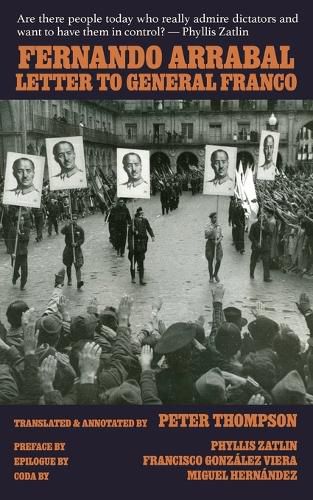Readings Newsletter
Become a Readings Member to make your shopping experience even easier.
Sign in or sign up for free!
You’re not far away from qualifying for FREE standard shipping within Australia
You’ve qualified for FREE standard shipping within Australia
The cart is loading…






Arrabal's famous Letter to General Franco, written and sent during the dictator's lifetime, is the most provocative of several "letters" he wrote to various political leaders and organizations. When Franco's insurrection began in 1936, Fernando's father was arrested for his loyalty to the Republic and sentenced to death. Though the sentence was later commuted and his father subsequently escaped, he was never seen again. About this Arrabal would write:
"Without trying to compare what is incomparable, when I confront these twilight episodes (and quite often without any logical connection), I think of that scapegoat, my father. The day on which the Uncivil War began, he was locked up by his 'compassionate companions' in the flag room of the Melilla military barracks. He was meant to think carefully, since he risked a death sentence for mutiny if he did not join them in their insurrection (alzamiento). After an hour, Lieutenant Fernando Arrabal summoned his ex-comrades - already! - to inform them that he had pondered long enough. Today, because of this precedent, shouldn't I serve as witness, example, or symbol, as he did, of the most fundamental occurrences? I, who am a mere exile."His exile in Paris, to escape a fate similar to his father's, did turn out to be productive, as his work there prompted New York Times' theatre critic Mel Gussow to call him the last survivor among the "three avatars of modernism".
The Letter to General Franco appears here for the first time in English.
$9.00 standard shipping within Australia
FREE standard shipping within Australia for orders over $100.00
Express & International shipping calculated at checkout
Arrabal's famous Letter to General Franco, written and sent during the dictator's lifetime, is the most provocative of several "letters" he wrote to various political leaders and organizations. When Franco's insurrection began in 1936, Fernando's father was arrested for his loyalty to the Republic and sentenced to death. Though the sentence was later commuted and his father subsequently escaped, he was never seen again. About this Arrabal would write:
"Without trying to compare what is incomparable, when I confront these twilight episodes (and quite often without any logical connection), I think of that scapegoat, my father. The day on which the Uncivil War began, he was locked up by his 'compassionate companions' in the flag room of the Melilla military barracks. He was meant to think carefully, since he risked a death sentence for mutiny if he did not join them in their insurrection (alzamiento). After an hour, Lieutenant Fernando Arrabal summoned his ex-comrades - already! - to inform them that he had pondered long enough. Today, because of this precedent, shouldn't I serve as witness, example, or symbol, as he did, of the most fundamental occurrences? I, who am a mere exile."His exile in Paris, to escape a fate similar to his father's, did turn out to be productive, as his work there prompted New York Times' theatre critic Mel Gussow to call him the last survivor among the "three avatars of modernism".
The Letter to General Franco appears here for the first time in English.